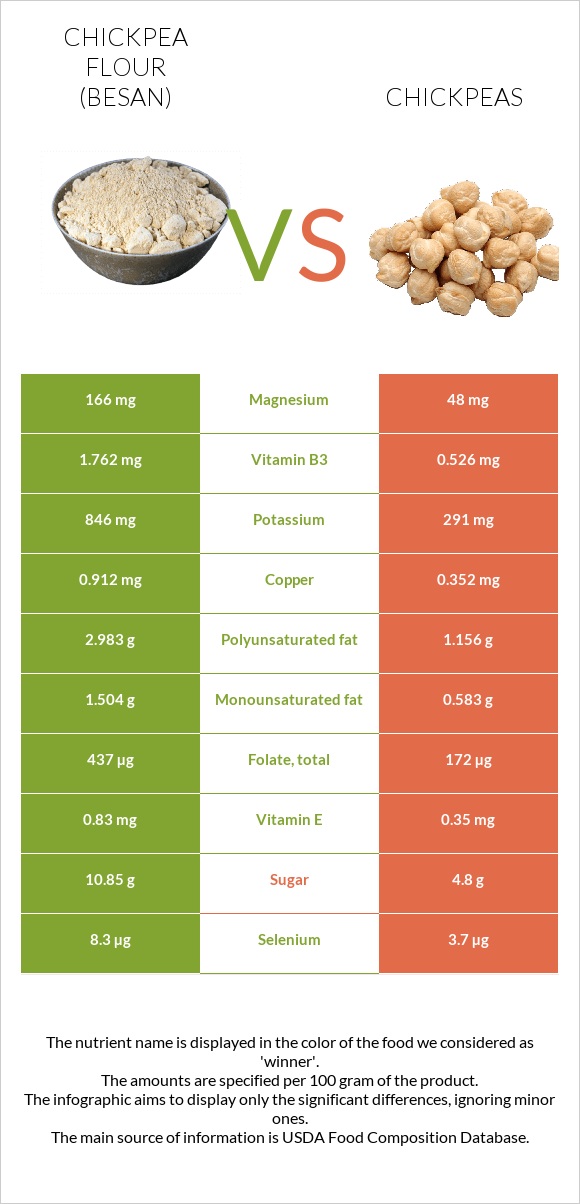Chickpea flour (besan) vs. Chickpeas — In-Depth Nutrition Comparison
Compare
The main differences between chickpea flour (besan) and chickpeas
- Chickpea flour (besan) is richer than chickpeas in folate, copper, vitamin B1, magnesium, vitamin B6, manganese, iron, phosphorus, potassium, and fiber.
- Daily need coverage for folate for chickpea flour (besan) is 66% higher.
- Chickpea flour (besan) contains 4 times more vitamin B1 than chickpeas. Chickpea flour (besan) contains 0.486mg of vitamin B1, while chickpeas contain 0.116mg.
Food types used in this article are Chickpea flour (besan) and Chickpeas (garbanzo beans, bengal gram), mature seeds, cooked, boiled, without salt.
Infographic

Infographic link
Mineral Comparison
Mineral comparison score is based on the number of minerals by which one or the other food is richer. The "coverage" charts below show how much of the daily needs can be covered by 300 grams of the food.
| Contains more MagnesiumMagnesium | +245.8% |
| Contains more PotassiumPotassium | +190.7% |
| Contains more IronIron | +68.2% |
| Contains more CopperCopper | +159.1% |
| Contains more ZincZinc | +83.7% |
| Contains more PhosphorusPhosphorus | +89.3% |
| Contains more ManganeseManganese | +55.3% |
| Contains more SeleniumSelenium | +124.3% |
| Contains less SodiumSodium | -89.1% |
Vitamin Comparison
Vitamin comparison score is based on the number of vitamins by which one or the other food is richer. The "coverage" charts below show how much of the daily needs can be covered by 300 grams of the food.
| Contains more Vitamin AVitamin A | +100% |
| Contains more Vitamin EVitamin E | +137.1% |
| Contains more Vitamin B1Vitamin B1 | +319% |
| Contains more Vitamin B2Vitamin B2 | +68.3% |
| Contains more Vitamin B3Vitamin B3 | +235% |
| Contains more Vitamin B5Vitamin B5 | +111.9% |
| Contains more Vitamin B6Vitamin B6 | +254% |
| Contains more Vitamin KVitamin K | +127.5% |
| Contains more FolateFolate | +154.1% |
| Contains more Vitamin CVitamin C | +∞% |
All nutrients comparison - raw data values
| Nutrient |  |
 |
DV% diff. |
| Folate | 437µg | 172µg | 66% |
| Copper | 0.912mg | 0.352mg | 62% |
| Vitamin B1 | 0.486mg | 0.116mg | 31% |
| Magnesium | 166mg | 48mg | 28% |
| Protein | 22.39g | 8.86g | 27% |
| Vitamin B6 | 0.492mg | 0.139mg | 27% |
| Iron | 4.86mg | 2.89mg | 25% |
| Manganese | 1.6mg | 1.03mg | 25% |
| Phosphorus | 318mg | 168mg | 21% |
| Potassium | 846mg | 291mg | 16% |
| Fiber | 10.8g | 7.6g | 13% |
| Zinc | 2.81mg | 1.53mg | 12% |
| Polyunsaturated fat | 2.983g | 1.156g | 12% |
| Calories | 387kcal | 164kcal | 11% |
| Carbs | 57.82g | 27.42g | 10% |
| Selenium | 8.3µg | 3.7µg | 8% |
| Vitamin B3 | 1.762mg | 0.526mg | 8% |
| Choline | 42.8mg | 8% | |
| Fats | 6.69g | 2.59g | 6% |
| Vitamin B5 | 0.606mg | 0.286mg | 6% |
| Vitamin K | 9.1µg | 4µg | 4% |
| Vitamin E | 0.83mg | 0.35mg | 3% |
| Vitamin B2 | 0.106mg | 0.063mg | 3% |
| Sodium | 64mg | 7mg | 2% |
| Saturated fat | 0.693g | 0.269g | 2% |
| Monounsaturated fat | 1.504g | 0.583g | 2% |
| Vitamin C | 0mg | 1.3mg | 1% |
| Net carbs | 47.02g | 19.82g | N/A |
| Calcium | 45mg | 49mg | 0% |
| Sugar | 10.85g | 4.8g | N/A |
| Vitamin A | 2µg | 1µg | 0% |
| Tryptophan | 0.085mg | 0% | |
| Threonine | 0.329mg | 0% | |
| Isoleucine | 0.38mg | 0% | |
| Leucine | 0.631mg | 0% | |
| Lysine | 0.593mg | 0% | |
| Methionine | 0.116mg | 0% | |
| Phenylalanine | 0.475mg | 0% | |
| Valine | 0.372mg | 0% | |
| Histidine | 0.244mg | 0% |
Macronutrient Comparison
Macronutrient breakdown side-by-side comparison
Protein:
22.39 g
Fats:
6.69 g
Carbs:
57.82 g
Water:
10.28 g
Other:
2.82 g
Protein:
8.86 g
Fats:
2.59 g
Carbs:
27.42 g
Water:
60.21 g
Other:
0.92 g
| Contains more ProteinProtein | +152.7% |
| Contains more FatsFats | +158.3% |
| Contains more CarbsCarbs | +110.9% |
| Contains more OtherOther | +206.5% |
| Contains more WaterWater | +485.7% |
Fat Type Comparison
Fat type breakdown side-by-side comparison
Saturated fat:
Sat. Fat
0.693 g
Monounsaturated fat:
Mono. Fat
1.504 g
Polyunsaturated fat:
Poly. Fat
2.983 g
Saturated fat:
Sat. Fat
0.269 g
Monounsaturated fat:
Mono. Fat
0.583 g
Polyunsaturated fat:
Poly. Fat
1.156 g
| Contains more Mono. FatMonounsaturated fat | +158% |
| Contains more Poly. FatPolyunsaturated fat | +158% |
| Contains less Sat. FatSaturated fat | -61.2% |





